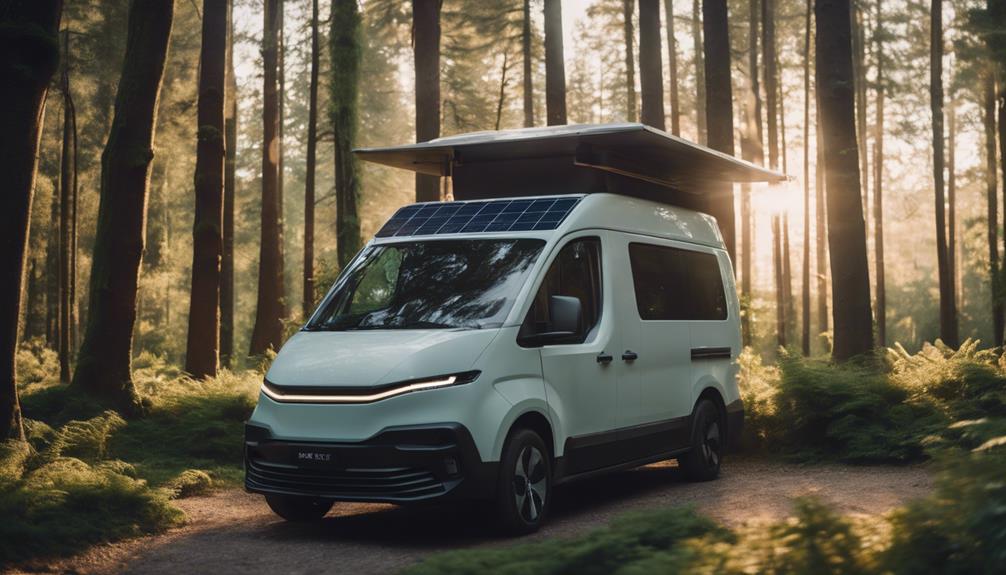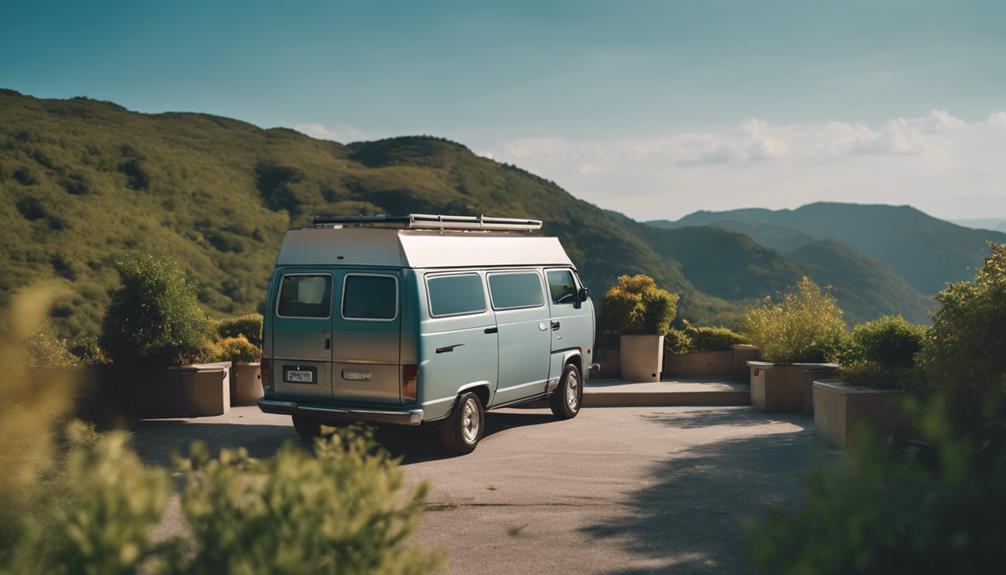If you're searching for the best mid-size van for camper conversion, the Ford Transit Custom and Renault Trafic are your top choices. The Transit Custom boasts a versatile layout with great fuel economy of around 30 mpg, making it perfect for long trips. Meanwhile, the budget-friendly Trafic doesn't skimp on comfort and offers reliable performance. Both vans strike an ideal balance between spacious interiors and manageable sizes, perfect for urban parking. Whether you want to customize or keep it simple, these vans have got you covered. Stick around to uncover more options and insights for your camper conversion journey.
Introduction
If you're considering a camper conversion, mid-size vans like the Ford Transit Custom and Renault Trafic strike the perfect balance between space and maneuverability. These vans cater to both solo travelers and small families, providing a spacious interior that allows for comfortable living on the road.
The Ford Transit Custom stands out with its versatile layout and customizable options, all while achieving an impressive fuel economy of around 30 mpg. This makes it a cost-effective choice for long trips.
On the other hand, the Renault Trafic offers a budget-friendly alternative without compromising on comfort and functionality. Its lower purchase price makes it an attractive option for those looking to save money while still enjoying the benefits of a camper conversion.
With a maximum payload capacity of 1,200 to 1,500 kg, you won't have to worry about fitting in all your equipment and materials. Additionally, with an average length of about 5 meters, both mid-size vans fit comfortably in standard parking spaces, enhancing convenience for urban living.
Choosing the right mid-size van can transform your travel experience, making it both enjoyable and practical.
Background Information
The popularity of van conversions has skyrocketed recently, as more people seek flexible living options on the road.
You might also notice a rise in electric vans, offering eco-friendly alternatives for your camper conversion.
This shift in demand is reshaping the landscape of mid-size van options available to you.
Van Conversion Popularity Surge
In recent years, camper van conversions have gained immense popularity as remote work and flexible travel options attract a diverse group of enthusiasts. The rise of van life culture has made mid-size vans like the Mercedes Sprinter and Ford Transit prime candidates for conversions. You'll find that DIY kits have become widely available, allowing you to customize your van to suit your unique needs.
Smart technology plays an essential role in enhancing the functionality of camper vans. Features like solar panels, smart thermostats, and integrated entertainment systems make your travels more enjoyable and convenient. This tech-savvy approach not only elevates your camping experience but also appeals to buyers in the resale market.
Speaking of resale values, well-maintained converted vans have shown impressive resilience, making them a smart investment. The growing emphasis on sustainability further fuels interest in eco-friendly materials and energy sources for your van conversion, aligning with broader environmental trends.
Emergence of Electric Vans
As manufacturers respond to the growing demand for sustainable transportation, electric vans are rapidly emerging as a viable option for camper van conversions. Models like the Ford E-Transit and Mercedes eSprinter are leading the charge, offering lower operating costs and reduced greenhouse gas emissions compared to traditional gasoline vans. This makes them particularly appealing to eco-conscious consumers looking to minimize their environmental impact.
These electric vans utilize advanced battery technologies, delivering ranges of about 100-150 miles on a single charge. This range is ideal for urban commuting and short-distance travel, enhancing their practicality for camper van conversions. Additionally, the expanding charging infrastructure across many cities makes it easier for you to recharge during your travels, eliminating range anxiety.
Government incentives and funding programs further bolster the shift to electric vans, encouraging more people to evaluate these models for their camper conversions. With the combination of lower operating costs and a commitment to sustainable transportation, electric vans are set to become a popular choice for those looking to explore the open road while being mindful of their carbon footprint.
Embracing this transformation not only benefits you but also contributes to a healthier planet.
Electric Van Innovations

Electric vans are changing the game for camper conversions with their impressive charging advancements and efficient battery systems.
You'll find that models like the Ford E-Transit and Mercedes eSprinter offer not only substantial range but also smart energy management features.
These innovations make it easier than ever to enjoy sustainable travel without sacrificing convenience.
Electric Van Charging Advancements
Recent advancements in electric van charging technology are transforming how you power your journeys, making rapid charging and enhanced efficiency more accessible than ever.
With high-powered charging stations now capable of delivering up to 350 kW, you can recharge 80% of your van's battery in just 20-30 minutes. This drastically reduces charging times, letting you get back on the road quicker.
Many electric vans also incorporate regenerative braking systems that convert kinetic energy back into stored energy. This feature not only enhances overall efficiency but also extends your driving range during city commutes. Plus, smart charging technology allows you to schedule charging during off-peak hours, helping you save on electricity costs while stabilizing the grid.
Innovations in battery technology, particularly solid-state batteries, are on the rise. They promise increased energy density, faster charging times, and longer lifespans compared to traditional lithium-ion batteries.
Meanwhile, the development of ultra-fast charging networks led by companies like Tesla and Ionity makes long-distance travel in electric vans more feasible and convenient, enabling you to explore further without the worry of running low on battery.
Battery Range and Efficiency
Innovations in battery range and efficiency are essential to making electric vans, like the Ford E-Transit, even more viable for camper conversions and longer journeys.
With a battery range of up to 126 miles on a single charge, electric vans are perfect for short trips and urban commuting. However, advancements like solid-state batteries promise to double this range in future models, enhancing your travel distances.
Regenerative braking systems play an important role in improving energy efficiency. They convert kinetic energy back into stored energy during braking, extending your battery life.
Additionally, the inclusion of energy-efficient heating and cooling systems in electric vans means you can enjoy comfortable conditions without draining your battery.
As charging infrastructure expands, you'll find fast-charging stations that can recharge your electric van up to 80% in about 30 minutes. This makes it easier to plan longer road trips and camper conversions without the constant worry of running out of power.
Embracing these innovations in battery range and efficiency will guarantee that your electric van experience isn't only enjoyable but also sustainable, allowing for more adventurous travels.
Expert Insights on Electric Vans
When considering electric vans for your camper conversion, it's essential to weigh the advantages and disadvantages.
You'll find expert analysis on features like range, payload capacity, and charging infrastructure that can considerably impact your travel plans.
Let's compare these electric options to see which one fits your needs best.
Advantages and Disadvantages
Reflecting on the growing popularity of electric vans, it's vital to weigh their advantages and disadvantages for camper conversions. One significant advantage is their operational costs; electric vans, like the Ford E-Transit, offer impressive fuel savings, averaging around 126 MPGe in city driving.
Plus, they produce zero tailpipe emissions, making them an environmentally friendly choice that resonates with sustainability goals.
However, the initial purchase price can be a hurdle, often exceeding $50,000. While incentives might help, you need to take into account if the long-term savings justify this investment.
Additionally, the charging infrastructure is expanding, but planning becomes essential for longer road trips to guarantee access to charging stations.
You'll also find that electric vans typically have less interior space due to battery placement. This can limit your options for a van conversion, so you'll need to put extra thought into layout and storage solutions to maximize the available space.
Balancing these advantages and disadvantages will help you decide if an electric mid-size van is the right fit for your camper conversion dreams.
Electric Van Expert Analysis
As you explore the world of camper conversions, understanding the electric van landscape reveals how advancements in technology and infrastructure can enhance your travel experience.
Electric vans like the Ford E-Transit and Mercedes eSprinter offer ranges of 60-100 miles on a single charge, making them ideal for short to medium trips typical of camper conversions.
The charging infrastructure is expanding rapidly, with over 100,000 stations across the U.S., easing concerns about long-distance travel. This growth supports the increased demand for electric vans, driven by rising environmental concerns and government incentives.
Additionally, electric vans typically feature lower operating costs, with electricity per mile being considerably cheaper than gasoline, which can greatly influence your budget considerations.
Many models come equipped with advanced technology features, such as regenerative braking and smart connectivity, enhancing both driving and living experiences on the road.
This combination of cost efficiency and modern conveniences makes electric vans a compelling option for your camper conversion journey. As you consider your choices, take into account how these factors align with your travel goals and lifestyle.
Electric Van Feature Comparison
Evaluating the features of electric vans reveals key differences that can greatly impact your camper conversion project.
For instance, the Ford E-Transit offers a generous payload capacity of up to 3,800 pounds, providing you ample space for all your conversion materials and amenities. In contrast, the Mercedes eSprinter, with a range of 96 miles, may limit your travel options but is still a solid choice for urban camper conversions.
When it comes to charging options, both electric vans support standard Level 2 chargers for a full recharge in about 8 hours. However, fast chargers can give you an 80% charge in just 34 minutes, which can be a game-changer during your trips. Additionally, both vans feature regenerative braking, enhancing efficiency and extending range while you travel.
As the demand for eco-friendly solutions grows, the camper van conversion market is seeing an influx of electric vans. Choosing the right model can considerably influence your sustainable travel experience.
Essential Tools for Conversion

When you're ready to convert your van, having the right tools makes all the difference.
You'll want to focus on safety and efficiency to guarantee a smooth process from start to finish.
Let's explore the essential tools that'll help you tackle your camper conversion with confidence.
Conversion Process Overview
To successfully convert a mid-size van into a camper, you'll need a range of essential tools that facilitate everything from cutting materials to securing fixtures.
A high-quality power drill is critical for guaranteeing everything is securely fastened, while a jigsaw allows you to cut wood and insulation to fit your van's interior dimensions. Measuring tape is fundamental for accurate measurements, helping you optimize storage space according to your individual needs.
In the conversion process overview, don't overlook a multi-tool, which is invaluable for making precise cuts and adjustments. A level will guarantee your installations, like cabinets and beds, are even and stable. You'll also want a stud finder to locate structural supports within the van walls, guaranteeing safe mounting of heavier items.
For electrical work, wire strippers and crimpers are essential for reliable connections, and a multimeter will help you test circuits for proper voltage levels.
Additionally, safety equipment like gloves and goggles is fundamental to protect against injury. By using these tools for camper conversion, you'll navigate the pros and cons of your project while keeping maintenance costs manageable.
Safety and Efficiency Guidelines
Incorporating solid safety and efficiency guidelines during your camper conversion not only enhances your living space but also guarantees a secure and functional environment on the road.
Start by focusing on proper insulation and ventilation to prevent moisture buildup, which can lead to mold and discomfort.
Utilize high-quality tools like a circular saw and drill for accuracy—this is essential for your camper's structural integrity. Additionally, enhance safety by installing smoke and carbon monoxide detectors, along with fire extinguishers, to protect against potential hazards.
When it comes to efficiency, consider your electrical system. Installing solar panels and a charge controller allows you to harness renewable energy, providing power for your appliances and lights without relying on gas.
Don't overlook maintenance. Regularly check your braking system and tires, as they're critical for safe driving, especially with the added weight from your conversion. Keeping everything in top condition guarantees your camper remains reliable on the road.
What factors make a mid-size van the perfect choice for camper conversion?
A mid-size van offers the best camper conversion base due to its perfect balance of size and versatility. With enough space for living quarters and storage, it’s easy to customize for sleeping, cooking, and traveling. The mid-size van’s maneuverability and fuel efficiency make it a practical and cozy choice for camper van conversions.
Conclusion
Ultimately, choosing the right mid-size van for camper conversion depends on your specific needs and preferences.
The best mid-size vans, like the Ford Transit Custom and Renault Trafic, offer a versatile layout that allows for personalized designs tailored to your lifestyle. If fuel efficiency is a priority, the Renault Trafic stands out with approximately 30 mpg, making it a budget-friendly option for van lifers who want to save on fuel costs.
Moreover, these vans strike an ideal balance between sufficient living space and compact size, making them practical for urban environments. With adequate interior height, you can enjoy comfortable living without feeling cramped. This feature is especially beneficial when converting your van into a cozy home on wheels.
Consider how you plan to use your van and what amenities you need. Whether you prioritize maneuverability or extra storage, the right choice will cater to your unique camping style. By evaluating these factors, you'll find a mid-size van that meets your requirements, ensuring your camper conversion is both enjoyable and functional for all your adventures.
Frequently Asked Questions
What Is the Best Van for Conversion to Campervan?
When choosing a van for camper conversion, consider factors like interior space, fuel efficiency, and customization options. The Ford Transit Custom, VW Transporter, and Renault Trafic are all solid choices that meet various needs.
What Is the Most Reliable Used Conversion Van?
When considering the most reliable used conversion van, you'll find the Ford Transit stands out for performance and maintenance. The Mercedes Sprinter also excels in durability, while the Ram Promaster offers budget-friendly reliability for urban living.
What Is the Best Budget Van to Convert to Camper?
If you're looking for the best budget van to convert to a camper, consider the Ford Transit Connect or Nissan NV200. Both offer great fuel efficiency and affordable prices, making them ideal for your camper conversion project.
Do Camper Vans Need to Be Leveled?
Camper vans don't always need leveling, but it can boost comfort and appliance efficiency. If you're parked on uneven ground, consider using leveling blocks or hydraulic jacks for a better experience during your stay.
Conclusion
In summary, choosing the right mid-size van for your camper conversion can truly enhance your adventures.
With innovations in electric vans and expert insights, you're better equipped to make an informed decision.
Don't forget to gather the essential tools needed for your project.
Embrace the journey of converting your van, and you'll create a perfect balance between comfort and functionality.
Get ready to hit the road and enjoy the freedom that comes with your new home on wheels!



















